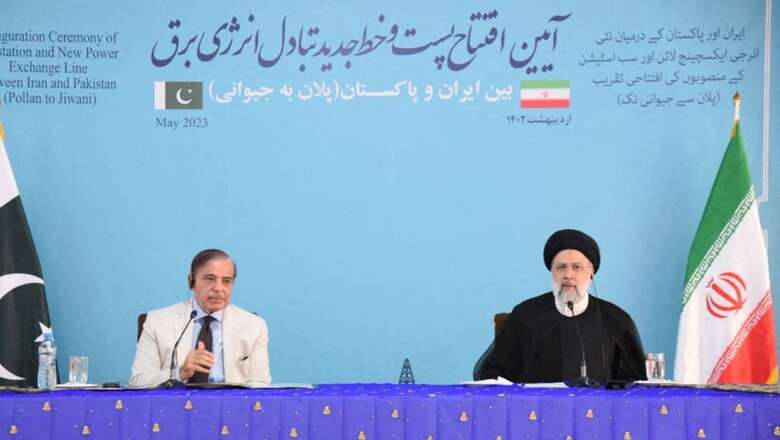
views
Peace is proving to be elusive in West Asia as the region remains mired in war and geopolitical chaos. Exacerbated by violence in and around the Red Sea, which has sucked more and more powers into the fray, who fear a global inflationary crisis, and Iran’s trigger-happy conduct this week launching strikes in Iraq, Syria and Pakistan, the situation is brimming with uncertainty.
There is hope that a combination of international pressure and an intricate slew of diplomatic efforts may bring about a temporary resolution and end the strife for now. The path to achieving peace, however, inevitably runs through Gaza—the epicentre of the crisis in the first place. It is here that Israel and Hamas are locked in a protracted war that refuses to die down.
Israel Forces a Strong Hand
There is a great power play ensuing in the midst of this war. Hamas’ unprecedented massacre of Israeli civilians on October 7, 2023, triggered a war that was certainly meant to be asymmetrical and gory. The objective of the terrorists and their patrons in Qatar and Iran was to scuttle an impending normalisation deal between Israel and Saudi Arabia, the de facto leader of most of the Islamic world, and rekindle the Palestinian issue back into the mainstream discourse. Israel’s retaliation was inevitable. What was not predicted, perhaps, was the extent of Israel’s wrath, that it would continue bombing Gaza till this day with American backing regardless of the human toll it has on Palestinians.
It is also surprising that the Saudis are still open to a peace deal with Israel, if it agrees to some shadow of statehood for Palestinians. The US, which is Israel’s largest military aid supplier, having sent billions of dollars in aid to the nation, is in favour of a similar trade-off.
Israel, however, is in a different frame of mind. Undeterred by the Houthis holding global shipping to ransom and the prospect of an all-out war with Hezbollah, Israel is outright opposing Palestinian statehood and is racing against time to debilitate Gaza and exterminate Hamas. It is exchanging heavy fire with Hezbollah in the northern front, attacking Iran-linked targets in Syria, and threatening to take on Iran directly.
In an answer to a reporter, Israeli Prime Minister Benjamin Netanyahu said, “Who says we aren’t attacking Iran? We are attacking Iran.” He went on to say that he is obligated to do everything to prevent Iran from attaining nuclear weapons.
Former PM Naftali Bennett was more hawkish in his tone while calling for direct confrontation with Tehran. “Iran is a terror octopus. Its arms—Hamas, Hezbollah and the Houthis—are sowing chaos and terror across the world. It’s time for the US and its allies to target its head, Tehran, and bring down its regime,” he said.
Israel has shown an appetite for a long war in Gaza with the ambitious goal of “clearing the territory” of Hamas. According to Netanyahu, 16 to 17 of Hamas’s 24 battalions have been destroyed, while clearing out the rest of them will take longer. While Houthis are being targeted by the US and allies in a series of airstrikes, Hezbollah is being bombarded by the Israeli Defence Forces and Hamas facing the death knell in Gaza, Iran’s key assets are strained out even as it faces threats of a direct attack. It is in this context that Iran’s latest posturing should be seen.
A Trigger-Happy Week
In just a week, Iran rained missiles upon ISIS targets in Syria, and what it claimed was a Mossad facility in Erbil, Iraq. This was surprisingly followed up by strikes inside Pakistan which threw diplomatic ties into a tailspin. Iran’s target was the Jaish al-Adl group in Pakistan’s Balochistan province. Jaish al-Adl is a Sunni Islamist separatist group which mostly targets Iranian personnel in South-eastern Iran, and enjoys safe haven in Pakistan, whose reputation as a state-backed terror-breeding hub did not help.
With its air defences caught napping and its Prime Minister blindsided by the Iranian foreign minister in a meeting on the sidelines of the World Economic Forum in Davos held around the same time as the strikes, Islamabad initially downgraded diplomatic relations and took 48 hours to retaliate, striking the Balochistan-Sistan province in Iran. Iran called for restoration of “brotherly” ties soon after, diffusing tensions. This signalled that neither side truly wanted to open up a front at their shared border.
Why Iran Struck Pakistan
Living on alms, Pakistan is in no position to bankroll another active front, especially as the Taliban insurgency emanating from Afghanistan takes root. Iran, on the other hand, is deeply engaged on internal and external fronts with its most prominent proxies— the Houthis, Hamas and Hezbollah in active conflict in the region and the ensuing costs will ultimately and for a large part be shouldered by Tehran.
This calls to question Iran’s actual intentions. With the regime under duress and anticipating a closer confrontation with Israel, which is increasingly contemplating a direct attack on Iran, a calculated show of military force may have been the objective— a tactical demonstration of Iranian brinkmanship, and a show of the regime’s credibility for internal consumption.
In striking Pakistani territory, Iran easily called Pakistan’s nuclear bluff. But this would not be the first time it did so, as this part of their shared border is riddled with terror, narcotics trade and human trafficking, and has even witnessed incursions, mortar shelling and border skirmishes in the past. Jaish al-Adl has orchestrated several attacks inside Iran, while Iranian media often claims that the US, Saudi Arabia and Israel are the primary backers of the group.
Pakistan’s current regime, dominated by the military leadership, is inching closer to the US. While it targeted only terrorist hideouts, Iran’s foremost message could also be aimed straight at the Pakistani leadership pointing towards the repercussions of collaborating with the US or even Israel, and pre-empting its use as a launch pad for attacks on Iran’s already disturbed eastern front.



















Comments
0 comment